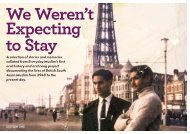Race, Faith and Community in Contemporary Britain Essays on Black, African, and African Caribbean Muslims in the UK PROUDLY MUSLIM & BLACK REPORT 2022
Black British Muslims play an important role in British society but are poorly represented in public discourse, policy, and indeed across a range of sectors. To overcome structural disadvantages and racism in society and in Muslim communities, we aim to create a platform for interventions in discourse and representation as well as in power relations. Our effort is collaborative and aimed at exploring the diversity, contributions, heritage, as well as the history of Black British Muslims. Our objective in this report is to create a platform to review and consider the current state of race and power relations, while creating networks and partnerships. In short, bringing Black British Muslim voices to the forefront is to work towards inclusion and belonging in British society and importantly, in British Muslim communities.
Black British Muslims play an important role in British society but are poorly represented in public discourse, policy, and indeed across a range of sectors. To overcome structural disadvantages and racism in society and in Muslim communities, we aim to create a platform for interventions in discourse and representation as well as in power relations. Our effort is collaborative and aimed at exploring the diversity, contributions, heritage, as well as the history of Black British Muslims. Our objective in this report is to create a platform to review and consider the current state of race and power relations, while creating networks and partnerships.
In short, bringing Black British Muslim voices to the forefront is to work towards inclusion and belonging in British society and importantly, in British Muslim communities.
Create successful ePaper yourself
Turn your PDF publications into a flip-book with our unique Google optimized e-Paper software.
There are only 2,000 artworks in the UK’s permanent art collection, which are by Black artists
(Larbi, 2020). This number is very low when considering that the UK’s permanent collection is
made up of millions of art pieces and objects. Most of the paintings and portraits hanging on
the walls of British galleries were created by white men and feature prominent white figures in
British and European history. Artists of African descent are absent from historical art collections
in some of the world’s largest museums, galleries and major auctions (Bishara, 2019).
The art world can be quite isolating for Black female artists and there is a stigma against artists
that are self-taught. I think this stems from those that have studied and dedicated their life to
art now competing with new and emerging artists.
I am Latifat, an IT Project Manager by profession and a self-taught visual artist. I have always
loved art from a very young age but due to my upbringing and culture I was always deterred
and influenced to focus on my academics. My parents, being first generation Nigerians in the
UK, believed the only route to success was to study hard to become a doctor, a lawyer or
an engineer. They did not perceive any form of art as a respectable or sustainable career to
pursue. I think today art within African culture is now increasingly being given the credit and
honour it deserves.
I have found inspiration for my art from my daily life as a Black woman in western society
growing and adapting to an ever changing and challenging world. Some examples of artists
that have inspired me are Damola Ayegbayo, Mellissa Falconer and Toyin Odutola. I love their
use of colours and expression in their paintings which I felt I could identify with. Toyin’s work
for me tells a story of Black ancient history and a journey into her imagination of what power
dynamics and women having ultimate power would look like.
My art represents the different stages of life from childhood to motherhood and aims to provoke
emotions around being a Black Muslim woman in modern society. My paintings are a fusion of
African culture, Muslim religion and British upbringing, all incorporating the challenges faced
along the journey of life.
I created a virtual art exhibition for Black History Month entitled ‘Her Story’ to elevate, motivate
and appreciate the richness of my heritage, religion, upbringing and culture. Each piece was
created to provide a sense of empowerment, self-love, representation, community and culture.
Each piece focuses on celebrating and paying tribute to Black women breaking barriers and
creating history, telling their story of strength, resilience and growth. I felt this year more
than ever was important to educate and promote a positive image of the Black community,
especially women during such a prominent month.
Latifat Obanigba is a British-Nigerian self taught freelance visual artist living
in London. She creates art using multiple different mediums. Her art aims
to elevate, motivate and appreciate the richness of her heritage, religion,
upbringing and culture enabling her to showcase the beauty of life through
her love of art. Her work is dedicated to the beauty and strength of Black
women as she believes Allah makes no mistakes and we are all uniquely and
beautifully made.
LATIFAT OBANIGBA
Visual Artist
As a Black artist I have identified with the underrepresentation of people of Black artists in the
art industry. My aim is to raise awareness around invisible and silenced topics that affect Black
women. An example is creating awareness and understanding of why Black women are 5 times
more likely to die during pregnancy or childbirth than women of any other race according to
MBRRACE-UK (2018) - a study that looks into maternal mortality of Black women in Britain.
Every piece I have created has a story and is dedicated to all Black women that are motivating
and inspiring others to be their best and strive for positivity.
38 39





